The Climate Action Monitor provides a summary of climate action centred on 51 countries covered under the International Programme for Action on Climate (IPAC). It is directed towards policy makers and practitioners to give them a broad overview of trends in climate action.
IPAC was established in 2021 by the OECD Ministerial Council Meeting to support progress towards net‑zero greenhouse gas (GHG) emissions and a more resilient economy by mid-century. It is overseen by the OECD Environment Policy Committee and is an integral part of the OECD’s strategy to incorporate climate action into all its work, harnessing a multi-disciplinary and whole-of-economy approach.
To support these global objectives, IPAC provides governments, through an indicator dashboard and analytical reports, with information and tools to monitor, evaluate and assess climate action based on data published by official sources or otherwise validated by countries. However, information for all countries and policies is not yet fully available. The challenge in the coming years is to ensure a coherent, consistent, and comprehensive set of indicators that can support countries’ policy choices to accelerate their transitions towards net zero.
The programme draws on a wealth of international climate-related data, indicators and research developed in partnership with the International Energy Agency (IEA), the United Nations Framework Convention on Climate Change (UNFCCC), the International Transport Forum (ITF), and the Nuclear Energy Agency (NEA), covering environmental, economic, and social dimensions of climate change. The information contained herein is based on the indicators developed by IPAC and on analytical work from the OECD and sister organisations.
This report was drafted by Rodrigo Pizarro, Abenezer Zeleke Aklilu, Hélène Blake, Amy Cano‑Prentice, Mikaël J.A. Maes, and Daniel Nachtigall. It builds on data collection by Carla Bertuzzi, Mauro Migotto, Santaro Sakata, Andrzej Suchodolski, Pinhas Zamorano, David Winkler, and Su Min Park. The work was carried out under the supervision of Nathalie Girouard, Head of the Environmental Performance and Information Division in the OECD Environment Directorate. Natasha Cline-Thomas, Beth Del Bourgo and Amelia Smith provided communications and publication support. Lydia Servant ensured administrative support and formatted the final document.
The authors would like to thank OECD and IEA Secretariat colleagues for their helpful comments on a previous version of the paper, including Ben Henderson, Kilian Raiser, Simon Touboul, Roberta Quadrelli, Luca Lo Re, Dan Wetzel, Gabriel Saive, Sarah Barahona, Santaro Sakata, Carla Bertuzzi, Kathleen Dominique, Sarah Miet, Andrzej Suchodolski, Julia Wanjiru, and Frédérique Zegel.
